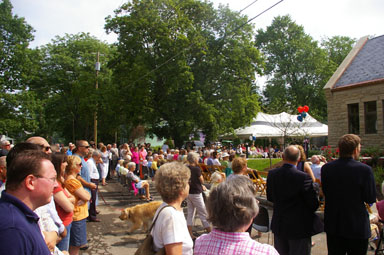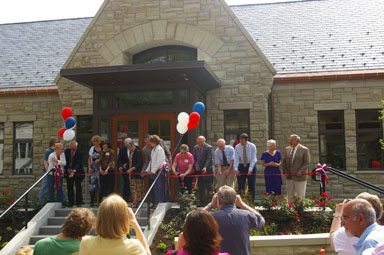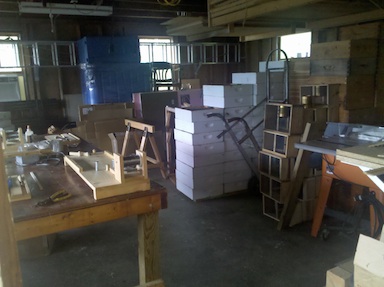June 6, 2011
Fire stopped in Varna
The Varna Volunteer Fire Company stopped a fire at 1015 Dryden Road Saturday, with the assistance of the Ithaca, Slaterville, and Etna fire companies, as well as the New York State Police.
The scene after an initial knockdown looked like:
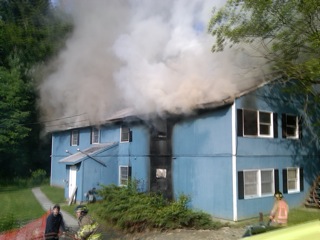
Initial scene.
The source of the fire was a grease fire in the kitchen, which spread above the stove:
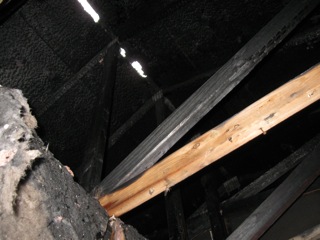
Charring above stove.
The building was certainly damaged, but the fire damage was contained to the apartment where the fire started.
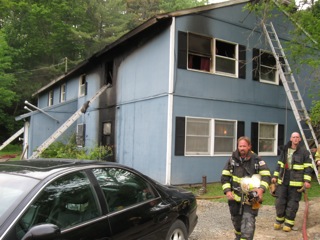
Exterior after fire extinguished.
These photos come from the VVFC, where I'm a supporting member. (I wrote some software that prints their badges - I don't, alas, actually fight fires.)
June 7, 2011
Southworth Library closes to get ready
A notice on the Southworth Library web site announces that:
We will be closed June 6 through June 17 as we move collections into place and prepare the new space. The due dates for any checked out items that would be due during that time period will be shifted to June 18. Items can be returned June 18 or the following several days without any fines incurred.
What's coming June 18th?
We are nearing completion of the Lincoln Center Addition and look forward to being able to provide this new marvelous space for our community!
Join us on June 18, 2011 at 10 a.m. for our dedication ceremony and ribbon cutting and at 1:00 p.m. for a special Family Storytime.
If you need to find some books in the meantime, Southworth Library cards work at any of the other libraries in the county.
Dairy Day is Saturday!
No, not this Dairy Day, though that's a good idea too.
Dryden Dairy Day opens with a parade at 9:30am down Main Street in the Village of Dryden. From 10:00am to 3:00pm, organizations and vendors will be in Montgomery Park, and you can usually talk with some cows and chickens as well.
You can see what it looks like here.
June 8, 2011
Town Board agenda meeting tonight
Come join the fun at tonight's 7:30pm Dryden Town Board meeting at the (air-conditioned) Dryden Town Hall - 93 East Main Street (Route 392) in the Village of Dryden.
I'll be there to get a sense of what's coming in zoning and hydrofracking-related laws. I'm especially curious whether they'll really push to pass either of those in July, as well as wondering what the details look like. They matter.
June 9, 2011
Republicans running for town offices
This Ithaca Journal article feels like a strange collision of this Saturday's Dairy Day and Dryden Republican Party press releases, but it does list the Republican candidates for town offices:
- Bruno Schickel - Town Supervisor
- Christopher Clauson - Town Justice
- Jim Drew and Deb Shigley - Town Board
- Bambi Avery - Town Clerk.
June 11, 2011
Hydrofracking and zoning conversations
Wednesday's agenda meeting was a dense series of conversations around zoning laws of various kinds. They started with a draft hydrofracking ban, which had by the most discussion, and then heard from Town Attorney Mahlon Perkins about the status of his tweaks to the zoning law.
The proposed ban is pretty simple, and seems likely to stay that way. It's a two-page amendment to the current zoning law, accompanied by a longer resolution that's mostly explanatory WHEREAS statements. It says that it clarifies the Dryden zoning law rather than changing it, and that all natural gas drilling is and has been prohibited in the Town under current zoning.
(I'd post a draft, but it changed a lot during the meeting, and I'm pretty certain that it makes more sense to wait a few days to point to the one the Town posts before its likely introduction Wednesday the 15th. The Board hopes to pass it in July.)
Most of that conversation was between Town Supervisor Mary Ann Sumner, Town Board member Jason Leifer, and Attorney Perkins. Much of that time was Leifer comparing the restrictions of the proposed law and the restrictions of a different, more comprehensive, approach that would ban high-impact industrial uses to bar hydrofracking rather than saying "no gas drilling allowed here".
The zoning conversation was far less detailed, more or less a report from Attorney Perkins on his review of the zoning draft. Since the Town hasn't distributed a draft since January and sections have moved and been renumbered, it wasn't a particularly valuable conversation. Well, except that it clarified that the Board seems to just want to get zoning done and will likely pass the current (I think deeply flawed) draft in July or August.
I worry about both of the laws discussed. I support a hydrofracking ban, but see little reason to ban "tradiitional" wells that use much simpler and less invasive technology. Everything I'd read about local regulation of extractive industries suggested that a simple ban might fail on multiple grounds. Even if a bill clarifying state law to allow towns to handle this through zoning passes, I'm still not certain that this ban would hold up. I would also prefer to see the more comprehensive approach because it seems more likely to limit the impact from surrounding towns that might allow drilling.
In the long run, however, I'm happier with the proposed drilling ban than I am with the zoning. First, I'm very impressed that the Town Board was willing to grapple with questions of a ban when they're certainly busy with other work. The July 1 release of the state's Supplemental Generic Environmental Impact Statement seems to have focused minds.
Second, the proposed ban is likely just the beginning of the conversation. It amends existing zoning law while new zoning is in the works, and lays a foundation for a ban in the new zoning. Concerns about hydrofracking have energized a huge number of people in the Town. Opponents have been far more numerous and visible. The 1600 signatures they collected on the hydrofracking ban petition is even more impressive when you consider that around 1400 votes is the number needed to win most Town elections recently. While we haven't yet heard that much from supporters of drilling, financial interests also have a way of mobilizing people.
Zoning isn't like that. Yes, people who've noticed the conversation look at the map to figure out what's happening to their parcel and their neighborhood, but that conversation doesn't create the same kind of active constituency. It's more abstract, and the dangers of failure, while real, don't normally threaten drinking water or scatter industrial development all over the rural landscape. Everyone has a financial interest in zoning - but except for a few people who want to develop or find themselves disrupted by development, those interests don't drive the same kind of immediate push.
My guess is that this ban is the opening shot of a long conversation. Republican Town Supervisor candidate Bruno Schickel was I think the only person there who questioned the wisdom of doing this, but I'm sure there will be more. It's also a long-term project, likely involving some court decisions and long-term evaluation of the best route to take on drilling. (This article in this morning's Ithaca Journal looks at some of the broader context and conversations in different municipalities.)
Zoning, on the other hand, seems like something the Town Board just wants to get over with. It certainly can be tweaked and updated, and definitely will be over time, but it's far less visible and there are a lot fewer people really focused on that law. The flaws in that law seem likely to stick around much longer.
(Updated to talk a bit more about the more comprehensive approach I prefer.)
Solid Shale - info on hydrofracking legislation
If you want to keep up with the Albany side of the hydrofracking story, I strongly recommend Solid Shale. It's "Solid info for NYS citizens who want their grandkids to be able to walk on unpolluted ground", which I like, but I suspect its legislative news updates are interesting enough even to people who eagerly await the arrival of hydrofracking.
June 13, 2011
'Rural node' planning won't work in Tompkins
The Ithaca Journal published a Guest Viewpoint piece of mine about nodal development. Unfortunately I was away and minimizing web contact, so I'm a little late, er, reporting on my own writing.
Squeezing that piece into 500 words was extremely difficult. It sums up about seven years of previous thought and writing, and relies on lots of sources there wasn't room to cite. In case anyone wants to follow this trail further, here's a version with hyperlinks to supporting conversation.
Tompkins County's developing plans for "rural nodes" are a disaster in the making, taking ideas that worked in urban settings and dropping them into new contexts where they can't work.
The 2004 Tompkins County Comprehensive Plan [16MB PDF] described an approach to nodal development attempting to ensure that "future development would shift away from suburban and rural areas, and into the city, villages, and hamlets," [page 69] reviving our rural hamlets and villages, encouraging walkable neighborhoods full of things to do while saving energy and improving our lives.
But the 2007 Route 13/366 Corridor Plan revealed that even if Dryden implemented all of its not-entirely-popular ideas, gasoline consumption would fall just 10%.
The more recent Route 96 Corridor Study [106KB PDF, page 2] offered a warning flag for "rural node" development: "Studies have indicated that a population of about 2,000 to 2,500 is required to support the most basic neighborhood-scale commercial services." Only Tompkins County's largest rural village, Groton, has more than 2000 residents - but it lost population over the last decade. [2010 Census data.]
The mostly Pacific Northwest studies behind nodal development explain a key issue: critical mass. Yes, an average household might meet 55% of its retail needs from businesses operating within walking distances, but a neighborhood of 1000 households can only support businesses for about 20% of its needs. Residents will have to drive for the other 80%, especially when neighborhoods lack jobs, schools, churches, or entertainment. Without the focus train stations provided railroad suburbs, mass transit won't help much either.
Northwestern cities have created much larger critical mass by specifying mandatory minimum densities for new construction [4.2MB PDF], and by locating new nodes within or near existing city life instead of out in the country. People seeking these features will look for them where they make sense - in a thriving city setting.
Designating land outside of a city as "mixed use" in the hope that walkable mixtures of residents, jobs, and retail will appear won't work at the scales possible in rural Tompkins County. They function differently: all of our villages and hamlets arose and thrived because they served markets beyond their core population. Business came from the road, or from the railroad.
Jane Jacobs' classic The Death and Life of Great American Cities warned of "in-between densities" that lack both the liveliness of a city and the quiet privacy of a suburb. They are "a bad long-term bet, destined to become a gray area".
Unless Tompkins County's population explodes, rural nodes will create more problems than they solve. If gas prices stay at current levels or below, nodes will generate traffic on two-lane highways where it is least wanted. If gas prices climb, rural nodes will be expensively isolated places to live.
There are many better ways to strengthen our rural villages and hamlets than to pour in housing and sprinkle in a bit of mixed use. We should not attempt to save our villages and hamlets by demanding that they behave like cities.
Comments so far seem stuck in politics - not unusual in newspaper comments, but I do wish that sometimes we could actually talk about these things rather than evaluating their usefulness as weapons.
Update: There's a response guest viewpoint. I'd love for someone to stand up and say my math is wrong, but it doesn't go anywhere near that.
June 14, 2011
Considering a hydrofracking ban Wednesday night
The Ithaca Journal has a piece on the Dryden Town Board's progress toward a ban on gas drilling, noting tomorrow night's meeting where a ban will be introduced. Introduction doesn't mean it passes - it means that there will be a public hearing and possibly vote on it in July.
The article reminds me that I somehow missed linking to Joe Wilson's some 'pesky facts' about gas drilling letter a couple of weeks ago.
June 15, 2011
A belt and suspenders
Here's a guest viewpoint from Joe Wilson and a number of other folks from DRAC explaining - more clearly, I think, than I did - why the "high-impact industrial uses" approach is a critical component of defending Dryden from the side effects of hydrofracking.
Drilling ban introduced; new zoning not introduced
A lot happened at tonight's Town Board meeting, and I'll need to report much more, but here's a too-quick summary.
The Board introduced an ordinance that would ban natural gas drilling by amending the existing zoning, and scheduled a public hearing on it for July 20th. I suspect that tonight's hour and fifteen minutes of comment will prove considerably shorter than what we hear on the 20th. Once the public hearing is complete, the board can vote on it (though it isn't required).
The new zoning, however, was not introduced. Attorney Perkins is still working on it, and there were a few substantive-sounding questions remaining, if I heard right. The board will also likely incorporate drilling bans into the new zoning, though they didn't discuss that in detail.
There were fewer people there tonight than at the petition presentation in April, maybe 60, of whom about a third seemed to oppose the ban.
More soon.
June 16, 2011
Southworth Library Lincoln Center dedication Saturday
Cathy Wakeman's Dryden Town Talk reports on last weekend's Dairy Day festival, and looks ahead to the Southworth Library's Lincoln Center dedication:
Community building for the future continues this coming weekend as the Southworth Library dedicates the Lincoln Center, the new 4,000-plus-square-foot addition to the library, an investment for library patrons for decades to come. The event begins at 10 a.m. on Saturday with local dignitaries. At 11:30 a.m., the bronze plaque "President Lincoln Reading to His Son Thad," sculpted by Dryden's own Jacques Shickel of Maryhill Clayworks, will be unveiled. The day appropriately culminates with a family story time at 1 p.m.
She also lists other upcoming events, including the Dryden Sertoma golf tournament June 24th, the gathering of the Dryden Intergenerational Summer Band and Chorus, the Dryden Presbyterian Church's summer hours, the Weeds 101 course from the Dryden Community Garden, and summer travel baseball.
June 17, 2011
More on drilling ban, library expansion
This morning's Ithaca Journal reports on local moves to ban gas drilling, with a focus on comments from Dryden's meeting Wednesday night.
There's also a piece on the Southworth Library's Lincoln Center expansion, which sounds great. There's also a photo gallery
Also, there will be a tree identification class at 4-H Acres Saturday morning at 10:00am.
Keep those old windows
Dryden is blessed with a lot of older houses. Many of them still have a feature that advertisement after advertisement demands we replace: double-hung windows with storm windows. When I did some major energy renovations a few years ago, I asked for an estimate including new windows, as I'd been brainwashed too. Fortunately, the contractor doing the work told me to pause that idea - it'd be a lot of money for very little energy efficiency result.
I've done a little window work, but my interest in doing it myself and my general lack of time have combined to keep me from getting far. However, a story ("Window Logic") in the August-September 2011 Old House Journal has me thinking it's time to get on that again:
We're losing 32 million original windows a year, based on the window industry's claims. In 99 percent of cases, people are replacing windows that can be cost-effectively restored and made as or more energy-efficient than a replacement window...
There is nothing green or environmentally sound about replacing replacing windows and dumping original, old-growth sash in a landfill. It's a tragedy. (17)
The Windows Preservation Standards Collaborative hopes to change this.
June 18, 2011
Ice cream and Varna planning Tuesday
I was going to post about this based on the postcard that came last week, but this description from Varna Master Plan Advisory Committee member Jim Skaley says far more. The short version: Ice Cream Social at 6:30pm, Varna planning conversation at 7:00pm Tuesday, all at the Varna Community Center, 943 Dryden Road in Varna.
You all hopefully received a postcard invite to a hands-on pre-plan workshop next Tuesday, June 21. The Varna Community Association is providing free ice cream with toppings starting at 6:30. Starting at 7 p.m. a short presentation on the recent Varna survey and how your participation in helping to design the hamlet plan will be made, afterwards---as I understand it--you will be adding your voice by making suggestions on what is important for the consultants and town planners to focus on, e.g. should the downtown area of Varna have sidewalks and bikeways to add safety for pedestrians and bikers, what kind of housing might be provided or is needed, issues of traffic calming, should we have some commercial re-development, and where, etc.
Behan Planning Assoc and a traffic engineer consultant will be attending so that you may have conversations with them regarding your issues and concerns. This is a once-in-a life-time opportunity for Varna residents to help define the type of community they would like to live in. The hamlet plan is supposed to be complete by early September after which it and recommendations for new zoning will be voted on by the Town Board for inclusion into the Town Zoning Law.
Please make every effort to participate and invite your neighbors who may not be on this list to come as well. It could be the best two hours you could spend to help your community grow in a way that preserves the amenities we have while addressing the real concerns that may left unattended cause neighborhoods to deteriorate. Varna can with some assistance be a very attractive place to be. But we all have to participate to make it happen.
June 19, 2011
Ludgate Farms for sale again
Just found this in my email:
Dear Friends,
Six months ago after learning Ludgate's was for sale we purchased the business, due to our passion and interest in continuing this unique and very special store. But now, Kate is missing her work running Peasant Dreams Farm, and Dave has a full-time day job that he enjoys. There is simply not enough time left over to manage the store properly in addition to our other commitments. Therefore, we have decided to sell the business to a buyer that can bring the store to its full potential, whether it is another family, or a cooperative of owner/operators like Greenstar.
As long time customers and members of the community, we want to preserve Ludgate's as an Ithaca "institution", and as a local alternative for quality food. We have made a number of physical improvements to the store, and we have improved some efficiencies to lower operating costs. Ludgate's supports more than 40 other local micro-businesses, ranging from produce and meat farmers to bakers, artisans and craftspeople. We've been working with a few select vendors to create a Ludgate's brand for exclusive coffee blends and baked goods, like Challah bread, shortbread and granola bars. That is the tip of the iceberg in terms of the potential of the store.
We are committed to keeping the store open and running until it is sold, and we ask for your continued support to help us keep it in good shape for the community, and for the next owner. By continuing to shop with Ludgate's you will help all of us preserve what we feel is a valuable community asset.
If you have any interest in taking over the reins of Ludgate's, or know someone that may be interested please drop us a note or contact our realtors, Margaret Snow at 607 218 2040 msnow@IthacaAreaHomes.com, or Stu Lewis 607 220 5319 bowtie023@aol.com. They both realize and understand what the importance of this store means to local residents.
Best regards,
Katie and Dave Quinn-Jacobs
kqj@ludgatefarms.com
June 21, 2011
Video of Wednesday Town Board hydrofracking ban discussion
I was still getting around to posting audio, but now there's video available from Shaleshock. It looks like the video is in several parts, capturing the discussion specific to the ban. If you put your mouse cursor over the video while it's playing, you'll see thumbnails appear on the bottom of the video listing more pieces you can watch.
Update: Here are direct links to the various parts:
Last-minute legislative hydrofracking maneuvers?
I noted earlier that New York State Senator Jim Seward had co-sponsored a Senate bill clarifying town's rights to regulate drilling through zoning, but Solid Shale reports that he's introduced his own bill.
Yesterday, the Assembly passed a "same as" bill matching the one he'd co-sponsored. There are some changes in the new one he's sponsoring.
I'm not sure where this is going, but definitely watch Solid Shale for faster reporting than I can likely manage as the legislative session hurtles to a close.
June 22, 2011
New Urbanist challenges my rural critique
I think it's mostly an exercise in missing the point, but Robert Steuteville seems to think that nodal development outside of cities is a great model. He doesn't actually address the question of whether it can work, which was my primary concern. I left a comment. We'll see if conversation breaks out, I guess.
Steuteville's blogging is also interesting reading, mostly focused on more traditional urban settings for urbanism.
June 23, 2011
What a hydrofracking build-out would look like
If you can stand to read another long document about hydrofracking, I strongly recommend this analysis of what a hydrofracking build out would be like (17.4MB PDF) around Cooperstown, an area not too different from here. (There's also a shorter background explanation here.)
Apparently the Tompkins County Council of Governments is working toward a similar document focused on this area.
Open Gate Garden and Art Tour Saturday
Here's something fun to do Saturday morning:
Just wanted to let you know about the Open Gate Garden and Art Tour happening this Saturday June 25th in Dryden from 9-1 pm. The gardens are in the country this year, and there will be interesting activities for the children, such as bunnies to pet, a wagon tour through the cow barns on the Space farm and a beehive to view close up or from a distance. The gardens are really special too, and include features such as rock walls, fountains, hand crafted pergolas, a scented garden and beautiful shrub borders. The tickets are $5 for adults and children 16 and under are free.
The tour begins at the George St. municipal lot in Dryden. From Cortland, go straight through the traffic light in downtown Dryden, then take your first right onto George St. From Ithaca, turn right at the four corners traffic light in downtown Dryden and then take your first right onto George St. You will see us there and can pick up your ticket, map and brochure. The history house will also have a garden exhibit and some items for sale there. You can ride the free shuttle vans to the gardens or drive yourself from George St.
Have questions? Let them know!
June 24, 2011
Pot swap through Monday
No, I'm not posting this for the multi-meaning headline. I'm posting it because I suspect there are a lot of folks like me who accumulate plastic pots from nurseries and would like to get rid of them in some more useful way than putting them in the trash.
Yes, it does require a drive down to Ithaca - combine it with another trip if you can! I have to buy rabbit and duck food there anyway.
4th Annual Gardener's Flower Pot Swap & Recycling Days
Friday June 24 - Monday June 27 at Tompkins County Cornell Cooperative Extension, 615 Willow Avenue, Ithaca NY
Are you looking for an environmentally friendly solution for what to do with the plastic containers from plants you purchased this spring? Bring your plastic nursery pots, seedling flats, plastic trays and cell packs (but no PVC!) any time on Friday-Saturday-Sunday-Monday and leave them in the designated area off the parking lot behind Cooperative Extension.
Home gardeners and growers may also take away as many pots as you can use! We also invite bedding plant and nursery growers to come select pots to reuse in your business!
At the conclusion of this collection drive, all pots and flats that remain will be trucked to Ultimate Recycling Plastics in Port Gibson (near Palmyra, NY) where they will get a new life as nailer boards. Sponsored by Cornell Cooperative Extension of Tompkins County Horticulture Program and Ultimate Recycled Plastics.
Google map to our location: http://ccetompkins.org/calendar/10/04/16/gardeners-pot-swap-recycling-event
Questions? Call CCE-Tompkins at 607-272-2292.
Southworth Library's Lincoln Center expansion dedicated
This is perhaps a story better told through pictures, though fortunately I took a lot.
I arrived in Dryden just a little too late Saturday morning and found parking spaces amazingly full, so parked on Union Street and walked over to the Southworth Library's new Lincoln Center Addition. The street was blocked off and there was quite a crowd. I'm guessing 200 or 250 people total, but I could be low, I think.
Southworth Library Association Chair Mary Ellen Rumsey welcomed the crowd and guests, and the Dryden Masons performed a cornerstone-laying ceremony, as they had for the original library. Mike Lane told the crowd the story of how the library and the addition had come to be, of the Southworths, Jennie McGraw-Fiske, and the Dwight family. The Dwights' work on the Lincoln Memorial had led to Robert Todd Lincoln giving John A. Dwight the manuscript of Lincoln's second inauguration speech, which he had then passed on to the library. The library kept it carefully until its recent decision to auction it. It went for $3.44 million, a large chunk of which went to build this much-needed addition.
Next up was the ribbon-cutting and the entry of people into the library.
Inside the library, visitors got to see local sculptor Jacque Shickel's bronze relief, "Lincoln reading to son". (You can find out more about it here.)
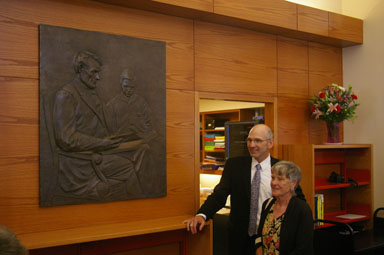
Sculptor Jacque Schickel by his Lincoln plaque with Southworth Library Association board Chair Mary Ellen Rumsey.
There's a lot more of the celebration, the people, and the building in the full set of pictures. They convey it much better than anything I can write.
June 25, 2011
Wednesday's Varna planning conversation
I only got to see a part of this, as Sungiva and Konrad had other plans and Angelika (who attends many fewer meetings than I do) had another meeting to attend. Sungiva was very interested in the ice cream social before the planning discussion and playing in the playground, before she got tired. Konrad fell asleep in my arms about ten minutes after I got there.
The setup was impressive, with white cardboard buildings on two maps of (well, most of) the hamlet core for discussion as well as two other tables exploring issues with Route 366 from the Pinewood Apartments to Game Farm Road. (The geographic scope of the project has shrunk since the December kickoff, which made it sound a lot broader.)
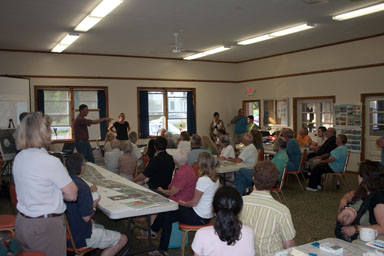
Varna community planning meeting.
There were "I ♥ Varna" stickers, ice cream and toppings to enjoy, and lots of neighbors to talk with.
One thing I haven't (yet) seen elsewhere was results from the survey they mailed a few months ago. If you want detailed results, click on these images and you should be able to get a big enough picture (hopefully) to read what the Town heard from residents.
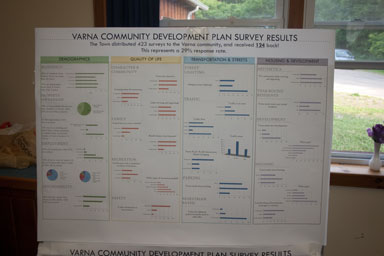
Varna community planning meeting.
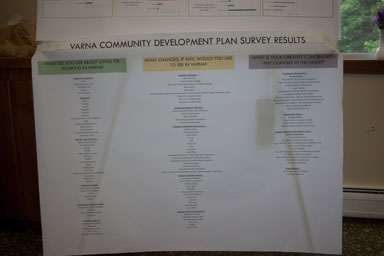
Varna community planning meeting.
After a quick introduction to the evening's events by Town Planner Dan Kwasnowski, Mike Welti of Behan Planning Associates opened with a brief presentation giving some background on the process and why this was happening. Then the community conversations at the tables got going - just as I had to depart.
If you want to see the little buildings, the crowd, or more of the posters, I've put up a gallery of photos. You can watch for more news at the Varna Community Development page on the Town of Dryden website.
June 27, 2011
Search continues for missing Freeville XtraMart manager
It's been a long time since I last wrote about missing Freeville XtraMart manager Bethanie "Buffy" Dougherty, but a poster looking for her has stayed up at the XtraMart all that time:
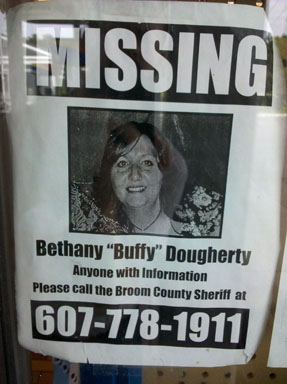
Looking for Bethany Dougherty.
Recently, a donation jar appeared on the counter, and a poster for an August 7th fundraiser went up.
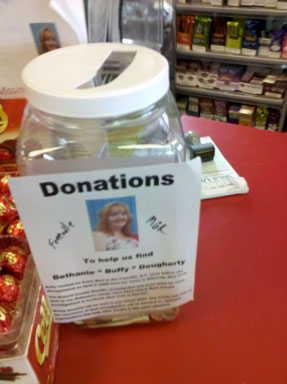
Taking donations for the search.
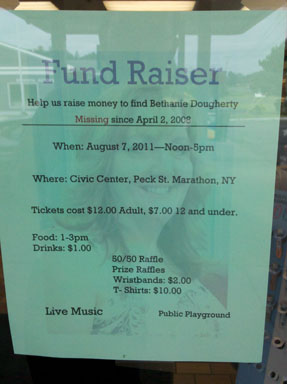
Fundraiser for Bethany Dougherty, noon to 5pm August 7th at the Civic Center on Peck Street in Marathon.
How much gas is there, anyway?
I wrote a bit about the economic uncertainties of shale gas drilling a while ago, but dueling articles in the New York Times and Ithaca Journal have me thinking that these questions are a long way from solved.
This morning's Journal trumpets two 'gushers' of wells in Pennsylvania that "illustrate the enormous potential of the Marcellus Shale natural gas field."
Meanwhile, yesterday and today, the New York Times posted two articles questioning how rich the field, and shale gas generally, really is - Insiders Sound an Alarm Amid a Natural Gas Rush and Behind Veneer, Doubt on Future of Natural Gas. The first explores skepticism in industry, the second skepticism in government:
But the gas may not be as easy and cheap to extract from shale formations deep underground as the companies are saying, according to hundreds of industry e-mails and internal documents and an analysis of data from thousands of wells.
In the e-mails, energy executives, industry lawyers, state geologists and market analysts voice skepticism about lofty forecasts and question whether companies are intentionally, and even illegally, overstating the productivity of their wells and the size of their reserves. Many of these e-mails also suggest a view that is in stark contrast to more bullish public comments made by the industry, in much the same way that insiders have raised doubts about previous financial bubbles. (From Insiders....)
One official says the shale industry may be "set up for failure." "It is quite likely that many of these companies will go bankrupt," a senior adviser to the Energy Information Administration administrator predicts. Several officials echo concerns raised during previous bubbles, in housing and in technology stocks, for example, that ended in a bust.
Energy Information Administration employees also explain in e-mails and documents, copies of which were obtained by The New York Times, that industry estimates might overstate the amount of gas that companies can affordably get out of the ground.
They discuss the uncertainties about how long the wells will be productive as well as the high prices some companies paid during the land rush to lease mineral rights. They also raise concerns about the unpredictability of shale gas drilling.(From Behind Veneer....)
Update: The Times has published another article, looking at the Securities Exchange Commission's role in this. The closing quote: "Welcome back to Alice in Wonderland." Update again: And another, on Congressional calls for an investigation. But One in Nine prefers the industry line.
There's also a piece about response to the NYT articles, with Congressman Ed Markey (D-MA) asking the EIA to explain its calculations.
The Journal and NYT pieces take very different tones, but I suspect that the underlying difference is timeframe. Gushers, to put it simply, don't always last, and natural gas wells seem to be even more abrupt than oil wells. Today's gusher may be tomorrow's empty well, or may require regular (and expensive) hydrofracking to keep anything coming out of it.
Unfortunately, I don't think we're going to have real answers to these questions for a few years at least. I'm not at all surprised that the industry would oversell the prospects and celebrate as loudly as possible when they strike a gusher - they want investors and leases, after all. We'd probably all be wise to stay cautious about claims about the prospects.
June 28, 2011
Raw milk coming to Dryden; fireworks Friday
Or from Dryden, and to Freeville.
This morning's Ithaca Journal reports that Jerry Dell Farm has started offering raw milk to customers, after receiving a state license last month. The article is largely about the controversies around raw milk, but there are some other pieces in there worth noting. I wasn't aware that Jerry Dell is "the Northeast's largest organic dairy", or that:
The license to sell raw milk comes weeks before the farm is about to open a farm store in Freeville that will sell their dairy products, both raw and pasteurized, in addition to produce from Ithaca Organics, an organic farm run by Sherman's brother Trevor.
It sounds like I may be visiting Freeville more often.
The Ithaca fireworks show is staying at TC3, with parking starting at 7:30pm and the fireworks at 9:45pm.
Also Friday, Governor Cuomo will get the next draft of the Environmental Impact Statement on hydrofracking, though it's not clear when that will be made public.
If you use Snyder Hill to get from Dryden to Ithaca, you should know that the Ithaca section will be getting repaved this August.
A very Dryden Honeybee Democracy
I'd heard about Tom Seeley's Honeybee Democracy from a wildly diverse array of places - the radio, friends, work, beekeeping lists, catalogs, and probably more. I'd been planning to buy it, but Angelika surprised me with it last week, borrowing it from the Tompkins County Public Library.
The focus of the story is, of course, honeybees, those amazing creatures that look like space aliens, function as a group, and give us delicious honey. The author, however, tells many more stories, of human researchers and explorers. Since he grew up in Ellis Hollow and still works in the area, there are lots of moments like this:
Bee trees... I located through a want ad I placed in the local newspaper, the Ithaca Journal. The ad read BEE TREES wanted, Will pay $15 or 15 lb of honey... (47)
I took each nest box to a place I knew that I'd enjoy in my home "territory" of Ellis Hollow, and nailed it about 5 meters (15 feet) off the ground onto the side of a large tree. I still remember vividly the thrill I felt a few weeks later, in late June, when I checked the nest box that I'd mounted on a dead elm tree along Cascadilla Creek and saw dozens of leather-colored honeybees bustling in and out of its entrance. (53)
To build the many nest boxes needed for this study, I spent most of my Christmas break in 1975 sawing and hammering and painting in the woodshop at Dyce Lab [on Freese Road]. (54)
The book goes many other places - Germany for the early experiments on bee swarms, Appledore Island off the coast of Maine to test bees in an isolated environment, and Bradford, Vermont, for a classic New England Town Meeting.
Seeley's story-telling goes beyond the usual dry reporting of hypotheses and experimental results to bring in the people and how those results came about. One thing I especially like about that story-telling is that it shows how in-the-moment decisions, changes to experiments, and simple close observation can lead investigations down new pathways.
Dryden itself doesn't function particularly like a beehive, though given that Seeley is studying mass departures through swarming in this book, that may not be a bad thing.
I strongly recommend the book, even if you don't like bees, primarily for its very different look at decision-making processes. I was a little less excited by the material comparing swarm decision making to primate nervous systems, but then I usually spend more of my time with people than with clusters of neurons. It definitely opens some new horizons in thinking about how groups work, and has me reconsidering some basic questions about decision-making on many scales.
[Disclosure: I know Tom Seeley's wife Robin, and she was actually a key person in getting me involved with the Dryden Democratic Party. It's been a few years since we've spoken, however!]
June 30, 2011
Community Fireworks Viewing Party on July 1 at VFW/American Legion on Route 13 in Dryden
Via the Dryden Community Center Cafe:
There will be a Community Fireworks Viewing Party on Friday, July 1 at the VFW/American Legion on Route 13 in Dryden beginning at 5p.m. Live music with The Prophets at 5:30 p.m. and Steve Southworth & The Rockabilly Rays at 7:30 p.m. Hamburgers, hot dogs and chicken spiedies will be available for purchase. Bar will be open. Free parking. Donations for the VFW/American Legion gratefully accepted. The VFW/American Legion has a terrific view of Tompkins Cortland Community College (TC3) where the fireworks will start at 9:45 pm.
The Journal also has advice for parking at TC3.
Fracking soon
Update: Confirmed: "...From "baseless speculation and premature" to complete truth in under four hours. Amazing." And here's the Ithaca Journal. Now on the DEC press release site too, and this Capitol Confidential post has the full text.
It sounds like Governor Cuomo wants to make conservative Dryden blogger One of Nine very happy by lifting the ban on hydrofracking in New York State except in the New York City and Syracuse watersheds:
The Cuomo administration is expected to lift what has been, in effect, a moratorium on hydraulic fracturing, a controversial technology used to extract natural gas from shale, people briefed on the administration's discussions said.
...by allowing the process in other parts of the state, Gov. Andrew M. Cuomo would open up New York to one of the fastest-growing - critics would say reckless - areas of the energy industry.
A Cuomo administration spokesman called the report "baseless speculation and premature" but notably did not call it wrong. The best analysis I've seen is this, which notes that "Members of the Cuomo administration certainly seem ready to take advantage of fracking if the DEC and the governor decide to allow it."
It's also worth noting that no legislation restricting hydrofracking or drilling made it through the Senate this session, despite some last minute maneuvering, though it is at least possible for it to come up again later.
Given the existence of an active well application in the Town of Dryden, I have to say this makes the Town Board's possible July 20th vote on the ban they introduced that much more important.
